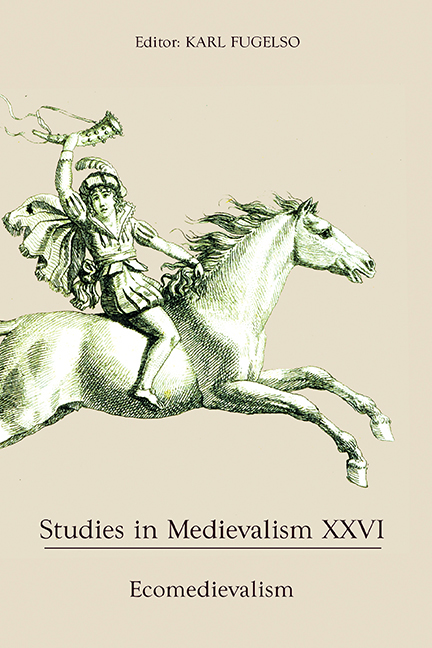Book contents
- Frontmatter
- Studies in Medievalism
- Acknowledgments
- Contents
- List of Illustrations
- Editorial Note
- I Ecomedievalism: Some Perspective(s)
- II Interpretations
- Fragmentary Dreams: John Aubrey's Medieval Heritage Construction
- Charter Horns and the Antiquarian Imagination in Early Modern England
- Giving Voice to Griselda: Radical Reimaginings of a Medieval Tale
- Medieval and Futuristic Hells: The Influence of Dante on Ellison's “I Have No Mouth and I Must Scream”
- Reading Westeros: George R. R. Martin's Multi-Layered Medievalisms
- Modernity in the Middle: The Medieval Fantasy of (Coopted) Feminism in Disney's Maleficent
- Future Medieval: (Neo)Medievalism in Babylon 5 and Crusade
- Cosmopolitan Anxieties and National Identity in the Netflix Marco Polo
- Mapping Everealm: Space, Time, and Medieval Fictions in The Quest
- Medievalisms of the Mind: Undergraduate Perceptions of the “Medieval” and the “Middle Ages”
- Mask of the Medieval Corpse: Prosopopoeia and Corpsepaint in Mayhem's De Mysteriis Dom Sathanas
- Contributors
- Miscellaneous Endmatter
Cosmopolitan Anxieties and National Identity in the Netflix Marco Polo
from II - Interpretations
Published online by Cambridge University Press: 15 September 2017
- Frontmatter
- Studies in Medievalism
- Acknowledgments
- Contents
- List of Illustrations
- Editorial Note
- I Ecomedievalism: Some Perspective(s)
- II Interpretations
- Fragmentary Dreams: John Aubrey's Medieval Heritage Construction
- Charter Horns and the Antiquarian Imagination in Early Modern England
- Giving Voice to Griselda: Radical Reimaginings of a Medieval Tale
- Medieval and Futuristic Hells: The Influence of Dante on Ellison's “I Have No Mouth and I Must Scream”
- Reading Westeros: George R. R. Martin's Multi-Layered Medievalisms
- Modernity in the Middle: The Medieval Fantasy of (Coopted) Feminism in Disney's Maleficent
- Future Medieval: (Neo)Medievalism in Babylon 5 and Crusade
- Cosmopolitan Anxieties and National Identity in the Netflix Marco Polo
- Mapping Everealm: Space, Time, and Medieval Fictions in The Quest
- Medievalisms of the Mind: Undergraduate Perceptions of the “Medieval” and the “Middle Ages”
- Mask of the Medieval Corpse: Prosopopoeia and Corpsepaint in Mayhem's De Mysteriis Dom Sathanas
- Contributors
- Miscellaneous Endmatter
Summary
Marco Polo: I've always been taken by the audacity of Alexander, the great conqueror.
Kublai Khan: There are twenty cities that bear his name. I now possess them all.
Marco Polo, “The Wayfarer”While there have been several film and television adaptations of Marco Polo's Travels since 1938, the Venetian explorer has experienced a surge in popularity since 2012. In that year, an illustrated edition of Henry Yule's translation of the Travels appeared, with an introduction and notes by Morris Rossabi, published by Sterling. The same year also saw the DVD release of a PBS documentary entitled In the Footsteps of Marco Polo, which recounted the travels of Denis Belliveau and Francis O'Donnell as they retraced Polo's journeys. In these recreations, Polo's journeys become the means to present the Middle East and Asia as unchanging, uncivilized sites of adventure – and thus of Orientalism. As the Middle East and Asia continue to be sites of Western attention, these recreations of Polo's adventures become increasingly relevant to Western audiences. Perhaps most notable in this regard is the 2014 Netflix series, called simply Marco Polo, which released a second season in the summer of 2016. With its tagline, “Worlds Will Collide,” the series establishes from its advertising alone its focus on intercultural contact and conflict.
I focus here on the first three episodes of the Netflix series in order to situate the show's anxious multiculturalism and Polo's sudden relevance in the face of prevalent twenty-first-century sociopolitical anxieties. Pamela M. Yee has recently written compellingly about the show's difficulties dealing with race and gender; here, I build on this work to examine the series’ concern with national-identity politics. Polo's travels make him especially relevant in our increasingly tense and interconnected global moment, and the series is the product of a context in which categories of national and transnational are in flux.
- Type
- Chapter
- Information
- Studies in Medievalism XXVIEcomedievalism, pp. 177 - 194Publisher: Boydell & BrewerPrint publication year: 2017

